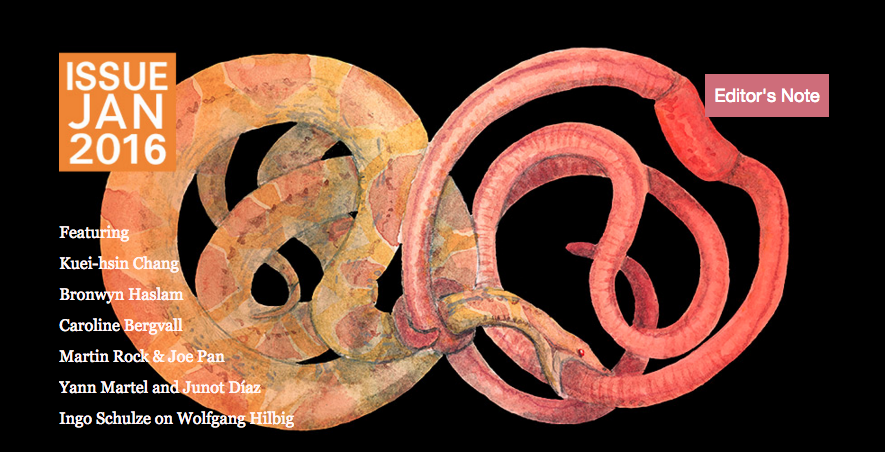It’s that quarterly, magical time of year again, guys: Asymptote is loud and proud with a stellar January issue. And this is not just any issue—it’s our fifth anniversary issue, “Eternal Return,” and that means Asymptote is practically old enough to head off to kindergarten and start finger-painting and writing poetry (after winning an award a the London Book Fair and becoming a member of the Guardian books network, of course).
It couldn’t be more fitting, then, that this issue features some of our most inventive, thrilling work to date: interviews with Yann Martel and Junot Díaz, a really, really cool experimental translation feature, work and an interview with Caroline Bergvall, and writing from authors that will be sure to capture your literary imagination—like Olga Tocarczuk, who was featured on the blog in a gripping essay by her translator Jennifer Croft—or this fascinating anonymous story called “The Legend of the Dakini Ray of Sunlight (White Tārā),” handily translated from the Mongolian by Ottilie Mulzet. Really, you can’t go wrong, but we can still try to point you toward our favorite issue picks this time around:
Ryan Mihaly, blog editor: Kenneth Rexroth called Kazuko Shiraishi the “Allen Ginsberg of Japan,” but it is clear from the three poems in our new issue that she deserves a distinction all her own. The poems—“By the Hudson River,” “Bird,” and “A Person Dies”—slip in and out of cold, hard realities and inner worlds of memory, spirituality, and far-reaching associations. Life, past lives, future lives, and death are all at work in these poems, and her images (as though a flesh with bone dropped from a dog’s mouth /I was dropped) are gripping. As an added bonus, you can hear Shiraishi read “By the Hudson River,” in Japanese, with trumpet accompaniment by Itaru Oki, to really feel the poem’s bluesy New York vibe. Yumiko Tsumura, who has translated three of Shiraishi’s collections, one of which is forthcoming this year, has wonderfully rendered Shiraishi’s poems in English. My favorite line:
when I sing I do a sinuous
dance as though the world exists in my hips
Martin Rock and Joe Pan’s excerpts from River | Horse | Haiku are something else. Rock and Pan offer four or five different translations of Nenten Tsubouichi’s modern haiku (including homophonic translations), accompanied by evocative word diagrams and poetic contemplations on the text. The word diagrams offer an entirely new way of looking at and understanding the haiku, which, despite their brevity, are complex and open to various interpretations. One diagram centers on the word / sound popo. Tanpopo is dandelion; popo-popo-popo is the sound of a steam engine; poppo is the manner in which steam rises; popo means “circumference.” And as Rock and Pan explain, “The tanpopo’s popo is the dandelion’s lion, but it is also the pop of Pop-Rocks, the pip of pomegranate, the chugga chugga of the choo-choo.” This is but one of many works in this issue’s experimental translation special feature. Get lost in all of them here.
Allegra Rosenbaum, assistant blog editor: A Day of Honey, A Day of Onions written and translated from Hebrew by Ada Aharoni is an excellently-crafted play about Jews in Egypt in the Mid-Twentieth Century. The play focuses on the love story of Esther and Rafi. It is so refreshing to read something in the midst of all the suffering in the world that ends at least on a somewhat hopeful note. Esther and Rafi are both Jews in Egypt and they face so many challenges: loss of wealth, loss of family members, lost loved ones, anti-semitism, ignorance, socio-economic status, and so much more. This piece is definitely a must in the new issue, especially for those of us glued to the depressing headlines in today’s world.
Selections from the St. Katharinental Sister Book, translated by Amiri Ayanna is an excellent exploration of the numinous and faith. The Sisters depict visions of Christ in situations of temptation, and of life-long faith. The piece is divided up into different stories of various devout Sisters and their pious lifestyles. A lot of the stories deal with moments of extreme faith that end in a pleasant vision of Christ. It’s a fascinating read, especially considering it was written by women in the 14th and 15th centuries.
Patty Nash, blog editor: I’m totally in love with these four poems by Alina Dadaeva, translated from the Russian by Alex Niemi. I’m writing this in Iowa City, where the outside temperature—a toasty -6 degrees Fahrenheit—leaves something to be desired, but I feel heat with sticky lines like:
Soviet string bags,
bitter rowan berries.
He has an ailing liver.
And at night
he cries for mama—
both that one and this one,
and both pitifully.
These poems hit so close to home with their claustrophobia and temperature that I find myself reading and re-reading each line. They are dizzying: their grammar and sound are neurotic, repetitive, truncated and elongated by commas and standalone imagery, as in the poem beginning with “little boy:”
Little boy, sliding from line of light
to line of scroll,
where letters of black
tangle together, like blackened chains
tangle together, like clinging leaves.
Little boy stooping, leaning, balding.
Little boy swallowing clear drops.
But the image work that these poems is one of bleak particularity and scope. For all their obsession with detail, read together, I get a sense of a cobbled-together landscape in their stark, wild imagery. And it’s a kind of brave new world worth reading, yet another reminder of what poetry—especially translated poetry—can do.

